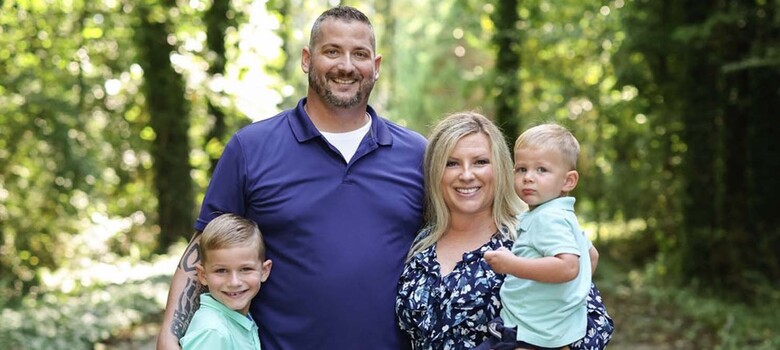Duke Palliative Care Provides Extra Support for State Trooper with Ewing Sarcoma

When Zach Martin was diagnosed with metastatic bone cancer in December 2022, a new palliative care program at Duke Health provided the extra medical and psychological support he, his wife, Ginny, and his young family needed. After Zach passed away in February 2024, Ginny said that the palliative care support was invaluable.
A Rare Diagnosis
Zach was 33 when he started experiencing chronic groin pain. The state trooper in Washington, NC, led an active lifestyle and thought he might have pulled a muscle while playing with his two young sons. After many tests, Zach was diagnosed with Ewing sarcoma, a bone cancer that occurs mostly in children and young adults in their early 20s. A diagnosis at Zach’s age was rare.
Soon Zach and his wife Ginny learned Zach’s cancer had spread. According to Zach’s medical oncologist, Juneko Grilley-Olson, MD, that can make Ewing sarcoma very difficult to cure. “Every once in a while, there will be a long-term survivor, but it’s rare,” she said. She, Zach, and Ginny hoped he would be that rare survivor and opted for aggressive treatment.
The Young Adult Sarcoma Palliative Care Collaborative
Like Zach, many people with Ewing sarcoma undergo aggressive treatment. That’s why Dr. Grilley-Olson teamed up with Ashley N. Allen, MD, MSPH, a palliative medicine doctor, to create the Young Adult Sarcoma Palliative Care Collaborative. The program ensures Duke sarcoma patients ages 18 to 39 receive specialized palliative care from the time they are diagnosed. “People are juggling so many different things at this time in life and need the extra support,” said Dr. Grilley-Olson.
Dr. Allen focuses on helping people like Zach manage symptoms of cancer and side effects of treatment, like pain and nausea, and improving their quality of life. “A big part of what we do in palliative care is making sure patients are taken care of holistically,” said Dr. Allen. She works closely with Dr. Grilley-Olson and other providers from the Duke Teen and Young Adult Oncology Program. The group meets regularly to discuss the care of each patient to ensure each patient has everything they need to feel heard and supported.
An Advocate and Resource for the Whole Family
As Zach progressed in his treatment, he struggled mentally. Dr. Allen connected him with Duke Health medical family therapist, Geoffrey W. Vaughn, LMFT, ATR, who is also a part of the Duke Teen and Young Adult Oncology Program. Zach was resistant to therapy at first, Ginny said, but he trusted Dr. Allen’s recommendation. “One of my most important roles is to be an advocate for patients,” said Dr. Allen. “His relationship with Geoff was incredible and I think that helped him through some hard months.”
In her role as a palliative care specialist, Dr. Allen connected Ginny with community resources to support her sons, and helped relay the message to Zach’s medical team when Ginny wanted additional scans done for Zach. “Anytime they wanted to do new treatments or scans, the team would all come together, and talk about the next steps,” said Ginny.
Transitioning to Hospice Care
Despite undergoing many months of treatments, including a hip replacement, radiation, inpatient chemotherapy, and steroids, Zach’s cancer continued to spread and eventually reached the lining of his brain “The whole team met with us,” said Ginny. “When we found out it was the end, Dr. Allen was there. She and Dr. Grilley-Olson cried with us.”
Dr. Allen helped Ginny coordinate inpatient hospice care, something Zach was initially resistant to. “For 15 months I’d been Zach’s caregiver,” said Ginny. “I had to tell him that if this was the end, then I simply wanted to be his wife. Dr Allen helped him to understand.” Zach passed away six days later at 35.
Reflecting on the experience, Ginny said she couldn’t imagine having gone through it without the extra support provided by Dr. Allen through the Young Adult Sarcoma Palliative Care Collaborative. She and Dr. Allen still keep in touch.




